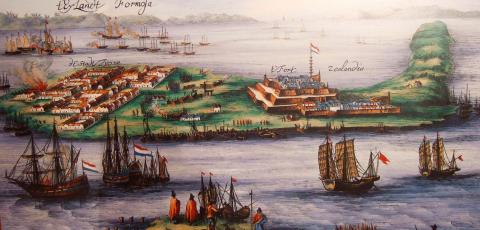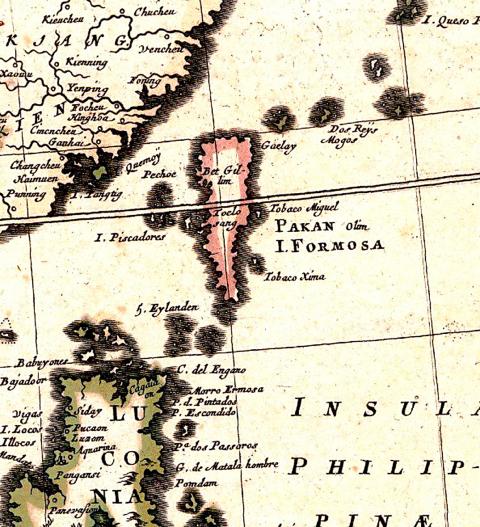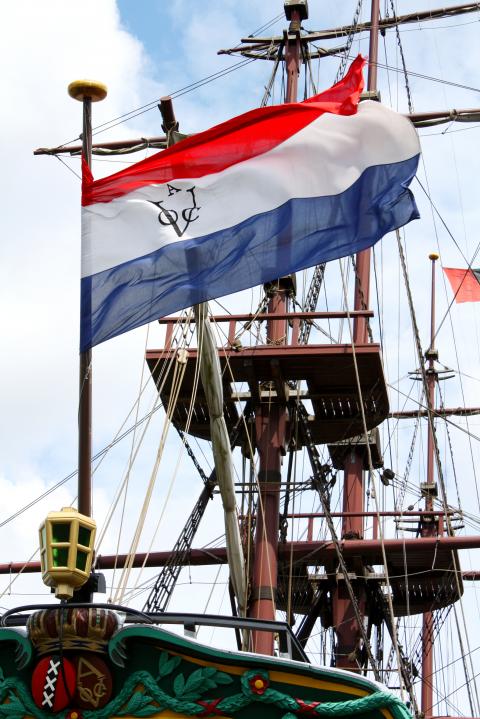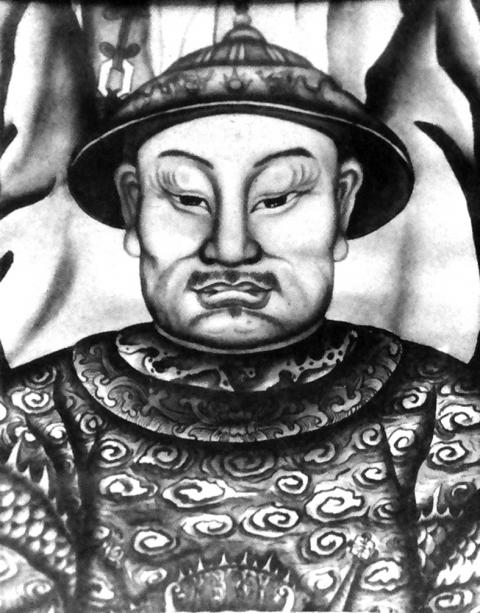Sept. 24 to Sept. 30
Qing Dynasty admiral Shih Lang (施琅) is not only known for destroying the Tainan-based Kingdom of Tungning (東寧) in 1683, he is also remembered as the man who, despite fierce opposition, convinced China’s Kangxi Emperor to incorporate Taiwan into the empire. However, some sources show that he was secretly plotting a different fate for the island.
In the time between the decisive Battle of Penghu in July 1683 to the formal annexation of Taiwan in April 1684, Shih repeatedly brought up the issue of Taiwan. The first mention came with his victory report, stating that he wouldn’t dare decide on his own the island’s fate, and urged the emperor to either make a decision or send his officials to Fujian Province, where Shih was based.

Photo courtesy of Wikimedia Commons
The emperor and his top officials did not respond to Shih’s inquiries, preferring to wait until the king of Tungning, Cheng Ke-shuang (鄭克塽), formally surrendered and arrived in Beijing. While Shih argued that Taiwan had “endless stretches of fertile land... where Chinese intermixed with local savages,” most officials did not think much of Taiwan, calling it a “speck of dirt on the outer seas with naked, tattooed savages not worthy of spending our resources on,” among other disparaging remarks. Some proposed only sending troops to Penghu.
According to Chou Hsueh-yu (周雪玉) in the book, The Merits and Demerits of Shih Lang’s Invasion of Taiwan (施琅攻台的功與過), the officials who opposed Shih’s proposals because they were unfamiliar with Taiwan, worried about the cost of keeping a distant land under control and lacked understanding of maritime defenses.
Shih insisted, citing Taiwan’s strategic location and abundant natural resources, adding that foreign powers, including the Dutch who had colonized part of the island, might cause trouble for the Qing.

Photo courtesy of Wikimedia Commons
THE GRAND SCHEME
A few historians speculate that there was talk about possibly handing Taiwan to the Dutch East India Company (VOC) in Batavia, which corresponds with present-day Central Jakarta in Indonesia. The Dutch were expelled by Cheng Ke-shuang’s grandfather, Cheng Cheng-kung (鄭成功, or Koxinga), in 1662.
Chou writes in her book that it was rival official Lee Kuang-ti (李光地) who proposed allowing the Dutch to return to Taiwan in exchange for yearly tribute.

Photo courtesy of Wikimedia Commons
However, Cheng Wei-chung (鄭維中) argues in his study, Admiral Shih Lang’s Secret Proposal to Return Taiwan to the VOC, that Shih was the one who plotted returning Taiwan to the Dutch.
In any event, upon the defeat of Tungning king Cheng Ke-shuang, officials in Guangdong and Fujian expected the Qing court to reverse its closure of the southeastern coast, and they started making moves to secure maritime trade rights. Some Fujianese officials had begun to entice Dutch merchants to return to the area, casually mentioning that the emperor “might even give up Taiwan,” writes Cheng Wei-chung.
On the same day that Qing officials met with the Dutch, Shih Lang delivered his report to the emperor, urging him to annex Taiwan. Meanwhile, to protect his financial interests in Fujian, he told Guangdong officials not to trade with the Europeans.

Photo courtesy of Wikimedia Commons
Shih’s next step was to persuade the British East India Company (EIC) and the Dutch to open offices in Fujian — a strategy that would require the emperor’s permission. Shih’s plan required some deft psychology that would convince the emperor that the British residents in Taiwan were prisoners instead of merchants, and that the EIC was grateful to the Qing for freeing them.
In turn, he would convince the emperor to demand tribute from the EIC in exchange for the right to trade in China via Fujian rather than Guangdong.
Shih also freed the Dutch prisoners who had been left behind in Taiwan after Koxinga’s conquest, including Alexander Van Gravenbroek, whom he treated with courtesy because he was fluent in Hoklo (also known as Taiwanese), the main language spoken in southeastern Fujian. Cheng Wei-chung writes that it is through Van Gravenbroek’s reports to the VOC that Shih’s plans to give Taiwan to the Dutch were revealed; there are no Chinese sources.
Shih asked Van Gravenbroek if the VOC would be interested in retaking Taiwan, and if so at what price. The Dutchman replied that the VOC wouldn’t be interested because of the dangers of the Taiwan Strait. Moreover, if they could not establish a base in China with exclusive free trade rights, governing the island would be too costly.
As with the EIC merchants before, Shih had Van Gravenbroek write a letter addressed to the emperor stating that the VOC wanted to resume trade with China, and thanking the Middle Kingdom for freeing the Dutch prisoners.
NOT SO SMOOTH SAILING
Cheng Wei-chung writes that if successful, the scheme would have greatly benefited Shih with “himself cast as the humble servant so selflessly devoted to his duty.”
Shih was banking on collecting money as the go-between for the foreign merchants and Beijing as well as taking bribes from Fujianese merchants for permission to trade with the Dutch. And finally, Fujian, where Shih had considerable economic interests, would have the upper hand against Guangdong.
However, the letters that Shih had the EIC and Van Gravenbroek write were confiscated by Fujian governor Yao Qisheng (姚啟聖), who may have been worried that the English and the Dutch would not cooperate so willingly, and might even expose Shih’s “reckless plan.” Yao also learned that the VOC had little interest in trading with Fujian.
Yao, however, died in 1684 and Shih continued his plan, attempting to convince the court to continue the maritime ban by fabricating, according to Cheng Wei-chung, a “foreign threat... so that he could be assured of being granted a monopoly on foreign trade in Xiamen and Taiwan.”
Between the noncooperation of the new Fujian governor, the emperor’s insistence on rescinding the maritime ban and Shih’s overconfidence in the VOC’s desire to trade with China and reoccupy Taiwan (they were more interested in India at that point), the plan ultimately failed.
Shih and his followers became wealthy nonetheless, claiming much of the farmland owned by the people of Tungning. He also collected tribute from Penghu fishermen, which he pocketed himself.
“This caused Taiwan’s devastation to be worse in peacetime under Shih than during the previous decades of war,” writes Shih Wan-shou (石萬壽) in the study, Discussion of Keeping or Leaving Taiwan (台灣去留之討論).
Taiwan in Time, a column about Taiwan’s history that is published every Sunday, spotlights important or interesting events around the nation that have anniversaries this week.

Jacques Poissant’s suffering stopped the day he asked his daughter if it would be “cowardly to ask to be helped to die.” The retired Canadian insurance adviser was 93, and “was wasting away” after a long battle with prostate cancer. “He no longer had any zest for life,” Josee Poissant said. Last year her mother made the same choice at 96 when she realized she would not be getting out of hospital. She died surrounded by her children and their partners listening to the music she loved. “She was at peace. She sang until she went to sleep.” Josee Poissant remembers it as a beautiful

For many centuries from the medieval to the early modern era, the island port of Hirado on the northwestern tip of Kyushu in Japan was the epicenter of piracy in East Asia. From bases in Hirado the notorious wokou (倭寇) terrorized Korea and China. They raided coastal towns, carrying off people into slavery and looting everything from grain to porcelain to bells in Buddhist temples. Kyushu itself operated a thriving trade with China in sulfur, a necessary ingredient of the gunpowder that powered militaries from Europe to Japan. Over time Hirado developed into a full service stop for pirates. Booty could

Lori Sepich smoked for years and sometimes skipped taking her blood pressure medicine. But she never thought she’d have a heart attack. The possibility “just wasn’t registering with me,” said the 64-year-old from Memphis, Tennessee, who suffered two of them 13 years apart. She’s far from alone. More than 60 million women in the US live with cardiovascular disease, which includes heart disease as well as stroke, heart failure and atrial fibrillation. And despite the myth that heart attacks mostly strike men, women are vulnerable too. Overall in the US, 1 in 5 women dies of cardiovascular disease each year, 37,000 of them

Before the last section of the round-the-island railway was electrified, one old blue train still chugged back and forth between Pingtung County’s Fangliao (枋寮) and Taitung (台東) stations once a day. It was so slow, was so hot (it had no air conditioning) and covered such a short distance, that the low fare still failed to attract many riders. This relic of the past was finally retired when the South Link Line was fully electrified on Dec. 23, 2020. A wave of nostalgia surrounded the termination of the Ordinary Train service, as these train carriages had been in use for decades